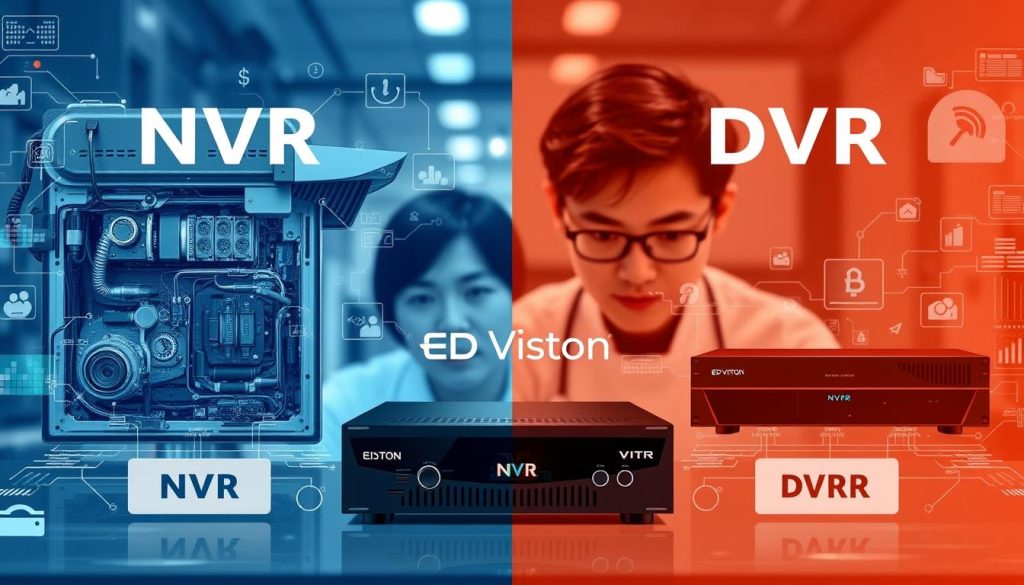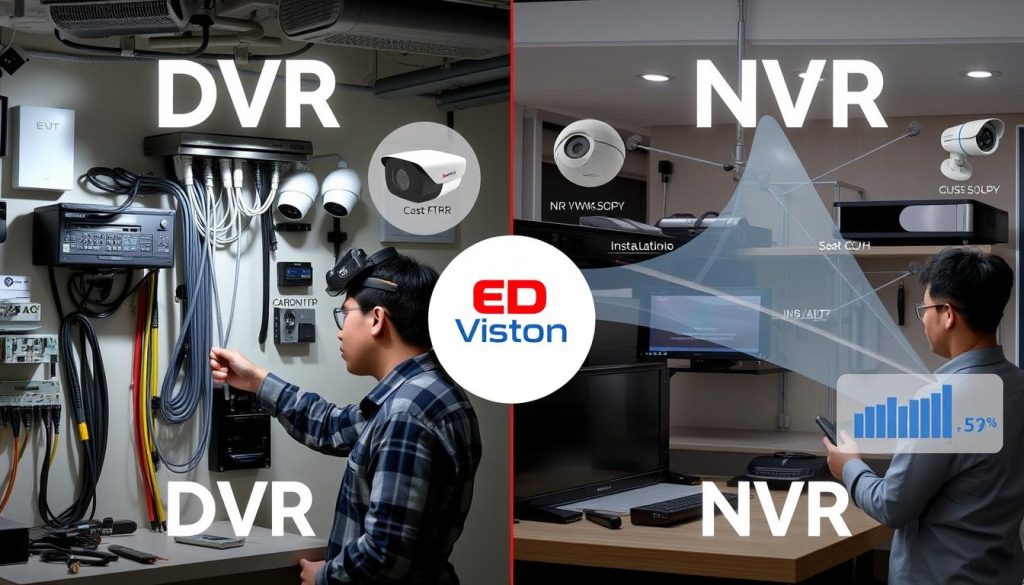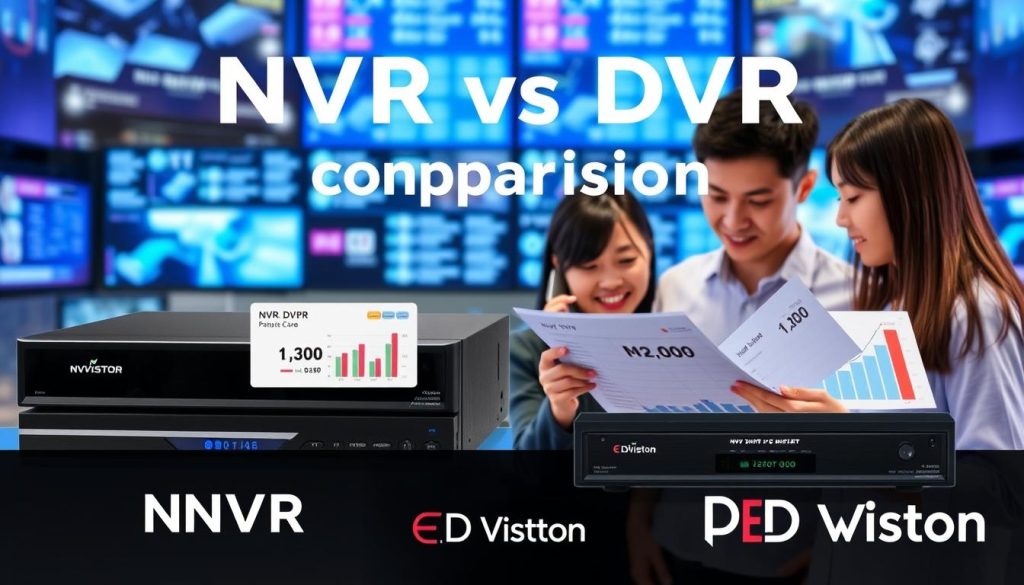Why does NVR cost more than DVR? This question is key to understanding security systems. NVR and DVR systems differ in technology, quality, and value. We’ll explore why NVR is pricier, focusing on features, ease of installation, and scalability.
This analysis helps you pick the best system and invest in your safety. Knowing these differences is essential for making a smart choice.
If you want to learn more about CCTV solutions and offers, contact ED Viston today at +65 8313 4578.
Key Takeaways
- NVR systems generally cost more upfront due to advanced features and capabilities.
- DVR systems offer a more budget-friendly option but with limited flexibility.
- NVR systems use Ethernet for simplified installation, while DVR relies on coax cables.
- Long-term savings can offset the initial cost of NVR systems due to their efficiency.
- NVR supports greater camera distances and advanced features, improving security.
NVR and DVR: A Brief Overview
NVRs and DVRs have different roles in surveillance systems. NVRs, like the NSN-608(4K)-8P, are great for network video recording. They use IP cameras for high-definition video, improving image quality and scalability.
Understanding NVR and DVR pricing shows NVRs are more costly upfront. Yet, they offer flexibility and future-proofing benefits. This makes them a good choice for modern businesses.
DVRs, such as the NSDV-208QK, work with analog cameras. They convert raw footage into digital formats. This makes them a cost-effective option for homes, fitting well with existing setups.
The NVR vs DVR comparison shows DVRs are simpler for surveillance needs. But, they don’t have the advanced features of NVRs.
Deciding between NVRs and DVRs depends on your needs. NVRs need a bigger initial investment for their advanced tech and high resolution. DVRs, on the other hand, use traditional wiring and are easier to install.
Both options are valid, making it important to consider your needs before choosing. For personalized advice and the latest CCTV solutions, contact ED Viston at +65 8313 4578.
Understanding NVR Systems
NVR systems are a top-notch way to watch over areas, using IP cameras for clear images. They have cool features like license plate and facial recognition. This makes them more expensive but worth it.
Unlike old systems that use cables, NVRs use Ethernet cables. This makes them easier to set up in tight spots.
One big NVR technology benefit is their ability to show high-resolution video, up to 4K. This is great for businesses that need clear footage. Plus, you can watch camera feeds from anywhere, which is super handy for companies with many locations.
Even though NVR systems cost more at first, they’re good value in the long run. You can easily add or remove cameras as needed. But, they do need strong computers and internet to work well.
In short, NVR systems might cost more upfront, but they offer great security features. For more info on how NVR systems can boost your security, call ED Viston today at +65 8313 4578. They’ll tell you about the latest CCTV solutions and deals.
Understanding DVR Systems
DVR systems use older analog technology for video surveillance. This DVR technology overview shows how they work with analog cameras. They are cheaper at first than NVR systems.
These systems use coaxial cables for video. These cables can go up to 500 meters. But, they don’t carry power like PoE cables do. So, each camera needs its own power source.
In a DVR setup, cameras connect to the DVR recorder with coaxial BNC cables. An AD encoder is needed to process the video. This makes the system more complex than NVR systems.
DVR systems have to connect each camera directly. This can lead to DVR limitations in signal quality. Image quality starts to drop after about 300 feet (90 meters).
Having separate power supplies adds complexity and cost. DVR systems might seem cheap at first. But, they can be more expensive to maintain over time.
Manual maintenance is often needed. This can lead to more costs. DVR systems also struggle with basic audio capabilities.
This overview shows DVR systems’ appeal for their initial cost. But, they have many complications and limitations. For those looking to upgrade or install, contacting ED Viston at +65 8313 4578 can help. They offer the latest CCTV solutions and tailored security options.
Why is NVR more expensive than DVR?
NVR and DVR systems differ in price due to technology and camera compatibility. Knowing why NVR costs more helps when picking a security system.
Technological Differences
NVR systems use advanced tech for high-definition video streams. They don’t use hard drives like DVRs do. Instead, they use network-attached storage (NAS) or cloud solutions. This makes them more expensive to run.
NVRs can handle up to 12MP resolution, which is higher than DVRs. They also have features like remote access and smart analytics. These features add to the cost but improve functionality.
Camera Compatibility
Camera compatibility also affects cost. NVRs need IP cameras, which are more advanced and pricey than analog cameras for DVRs. This makes NVRs more expensive overall.
Users choosing NVRs will pay more for cameras and the tech needed for setup. This is a key reason for the price difference between DVR and NVR systems.

Knowing these points helps users make better choices. For the latest in CCTV solutions and offers, contact ED Viston at +65 8313 4578 for help.
Image and Audio Quality Comparison
When we talk about surveillance systems, image and audio quality are key. NVR and DVR systems differ in how well they work. Knowing these differences helps us make better choices.
NVR Advantages in Quality
NVR systems lead in image quality, with resolutions from 4MP to 12MP or more. This means they capture even the smallest details clearly. DVR systems, on the other hand, top out at about 5MP, limiting their detail.
NVR also often comes with better audio recording. This is because many NVR systems have built-in audio. This makes the surveillance experience better. So, when choosing, the NVR vs DVR audio quality is a big factor.
DVR Limitations
DVR systems might be cheaper upfront, but they have big quality limits. They often don’t have built-in audio unless you add special cables. This means you might miss important sounds during recordings.
Also, DVRs usually can’t match the high resolution and frame rates of NVRs. For top-notch security, the choice between NVR and DVR is clear. NVRs offer better quality and audio, making them better for monitoring.
For custom surveillance needs, contact ED Viston today at +65 8313. Learn more about the latest CCTV solutions & offers.
Installation Differences
Choosing between NVR and DVR systems affects how easy or hard installation is. Knowing these differences helps people make better choices for their security needs. This can also affect how much they spend.
NVR Wiring Simplified
NVR systems make installation easier with a single cable for power and data. This cable lets you place cameras up to 1,000 feet away without losing signal quality. This makes setting up cameras faster and easier.
With fewer cables and parts, NVR systems are simpler to manage. They also make it easier to add more cameras later. This can save money on installation costs.
DVR Installation Challenges
DVR systems, on the other hand, need more work to install. They require two cables: one for power and another for data. This makes the installation more complicated and more expensive.
Each camera needs its own wiring, which can lead to signal loss. This is a big problem when cables are over 500 meters long. These issues make DVR systems more costly to set up.

If you’re looking into new security tech, it’s key to understand these differences. For more information and custom solutions, call ED Viston at +65 8313 4578. They can help with the latest CCTV solutions and offers.
Scalability and Flexibility
When looking at surveillance systems, it’s key to know the difference between NVRs and DVRs. NVRs stand out because they can grow with your business easily. They let you change your surveillance setup as your needs change.
NVR Expansion Capabilities
NVRs are great because they let you add or remove cameras easily. This makes it simple to keep your security up to date as your business grows. You can add more cameras quickly without a big hassle or cost.
This flexibility means your surveillance system can always meet your changing needs. It’s a smart choice for businesses looking to grow.
DVR Limitations
DVRs are reliable but have big growth limits. They can only handle so many cameras, making it hard to add more. This can lead to big costs and headaches when you need to expand.
Knowing these DVR limits helps you see why NVRs are a better choice for the long run. They offer more flexibility and can grow with your business.
| Feature | NVR | DVR |
|---|---|---|
| Scalability | Highly scalable; easy addition of IP cameras | Limited; requires extensive rewiring for expansion |
| Camera Compatibility | Supports a wide range of IP cameras | Primarily compatible with analog cameras |
| Installation Complexity | Relatively straightforward installation process | More complex; may require professional installation |
| Future-Proofing | Better suited for adapting to new technologies | Less adaptable to advancements in technology |
For businesses looking ahead, NVRs are the clear choice. They offer better scalability and flexibility. If you want to improve your surveillance, call ED Viston at +65 8313 4578. They can tell you more about the latest CCTV solutions and offers.
Cost Analysis: NVR vs DVR
Choosing between NVR and DVR systems is a big decision for buyers. A detailed NVR vs DVR cost comparison shows big differences in initial costs. NVR systems cost more upfront because they offer better resolution, more features, and advanced tech.
NVR Upfront Costs
NVR systems have higher upfront costs for several reasons. They use IP cameras that can go up to 4K or 8K, which adds to the price. They also have advanced features like motion detection and remote access, which require more money.
Being able to connect many hard drives is another reason for the higher cost. This allows for storing lots of video footage over time. It makes NVR systems great for those who want long-term surveillance.
DVR Price Point Benefits
DVR systems, on the other hand, are more affordable. This makes them popular for small or immediate needs. Switching to DVR from analog cameras can save money because you don’t have to replace cameras.
DVR systems are also easy to set up and use. This is good for people who aren’t tech-savvy. While DVRs may seem cheaper, it’s important to think about long-term costs and needs.
Understanding the NVR vs DVR cost comparison helps buyers make better choices. It’s about finding what fits your needs and budget. For more info on CCTV solutions and offers, call ED Viston at +65 8313 4578.
Factors Affecting NVR Pricing
NVR pricing is influenced by several factors. Newer systems, with their advanced technology, cost more. Knowing these factors affecting NVR pricing helps businesses choose the right surveillance system.
Technological Advancement Costs
NVRs use the latest tech for better performance. Features like cloud storage and video analytics add to the price. These advancements improve security and make operations smoother.
Though the initial cost is high, the long-term benefits are worth it.
Feature Richness
The advanced features of NVRs affect their price. They offer high-resolution video and advanced features like motion detection and facial recognition. This means more value for the money spent.
Investing in NVRs may seem expensive at first. But, it leads to better security and performance for businesses.
| Feature | NVR | DVR |
|---|---|---|
| Camera Compatibility | IP Cameras | Analog Cameras |
| Image Quality | Higher Resolution (4K, 5MP) | Lower Resolution |
| Storage Options | Cloud Storage | Local Hard Disk |
| Installation Flexibility | Wired/Wireless Setup | Wired Setup Only |
| Advanced Features | Motion Detection, AI | Limited Features |
It’s important for businesses to understand these factors for better surveillance investments. For personalized advice on CCTV solutions, call ED Viston at +65 8313 4578. Learn about the latest offers available.
Conclusion
In this NVR vs DVR summary, we looked at the key differences in cost and features. NVR systems are pricier but offer better image quality and more scalability. They are a smart choice for businesses looking for top-notch security.
NVR systems use IP cameras that can reach up to 4K resolution. This means clearer and better video quality for monitoring.
When it comes to cost, DVR systems might seem cheaper at first. But they have limits in scalability and image quality. Businesses need to think about their needs, like how big their property is and how clear they want their video to be.
More and more companies are switching to NVR systems. They now make up about 75% of CCTV setups in offices. This shows that investing in advanced tech is worth it in the long run.
To talk about the latest CCTV solutions for your needs, contact ED Viston at +65 8313 4578. You can also check out Wenhong’s website for more on IP CCTV systems.
FAQ
Why is NVR more expensive than DVR?
What are the major differences between NVR and DVR systems?
How does the installation process differ between NVR and DVR?
Are there long-term costs to consider when choosing between NVR and DVR?
What factors affect the pricing of NVR systems?
How does video quality differ between NVR and DVR systems?
Is scalability a concern when choosing between NVR and DVR?
Source Links
- https://mammothsecurity.com/blog/nvr-vs-dvr
- https://solink.com/resources/dvr-vs-nvr-which-is-better/
- https://sirixmonitoring.com/blog/dvr-vs-nvr-whats-the-difference/
- https://nellyssecurity.com/blogs/articles/whats-the-difference-between-an-nvr-and-a-dvr?srsltid=AfmBOootbknjESslKR3zlhcC6LCrA2DqVHrsvXAt82i2Kovcz6Azz2Qm
- https://www.versitron.com/blogs/post/nvr-or-dvr-which-video-surveillance-system-is-right-for-you?srsltid=AfmBOor7-SFNVYUjb5ifnBYzBnDXgRcoSjw01_9pXZ89YLWc5HGF0ss_
- https://ajax.systems/blog/nvr-vs-dvr-key-differences/
- https://www.dtiq.com/resources/dvr-vs-nvr-whats-the-difference-and-what-do-i-need
- https://www.pelco.com/blog/nvr-dvr-guide
- https://info.verkada.com/compare/dvr-vs-nvr/
- https://blog.swann.com/dvr-vs-nvr-whats-the-difference/
- https://www.firstsolution.com.sg/blog/dvr-vs-nvr-which-is-better-for-cctv-surveillance/
- https://nellyssecurity.com/blogs/articles/whats-the-difference-between-an-nvr-and-a-dvr?srsltid=AfmBOorgzfwwJC7w5m9qyNa6CgQBo0HFINX1NTNRK0uO4_7Yf4znBRCt
- https://www.avigilon.com/blog/nvr-vs-dvr
- https://reolink.com/blog/dvr-vs-nvr-which-one-is-better/?srsltid=AfmBOopC2Yw-yi4r9j1JHXsRl7GimBa1GCvyBVnvKSFU8lI6ojAcPT06
- https://web.securitysystem.com.sg/dvr-vs-nvr/
- https://www.versitron.com/blogs/post/nvr-or-dvr-which-video-surveillance-system-is-right-for-you?srsltid=AfmBOoozsyPnydw-WKkfKXOJ8qMBbQT3BStLt8hG9io8p5gx2kuAWZf2
- https://www.coram.ai/post/dvr-vs-nvr-key-difference
- https://www.spot.ai/articles/nvr-vs-dvr
- https://www.videoexpertsgroup.com/nvr-vs-dvr/
- https://www.a1securitycameras.com/blog/which-is-better-nvr-or-dvr/?srsltid=AfmBOoqxOR2QOPjj4zyxTv1-QwIbrlzPLGCXmmSu_I-6tnpJcJTAFA06
- https://butterflymx.com/blog/nvr-vs-dvr/
- https://reolink.com/blog/dvr-vs-nvr-which-one-is-better/?srsltid=AfmBOorAH58aCdz1KYaf-RBK2bJx7jahdhg3RPGvci3Te69s7cD5SWmt
- https://impulsecctv.com/blog/choosing-between-nvr-and-dvr-for-your-security-camera-system/
- https://upcomingsecurity.co.uk/security-guides/cctv-camera-guides/nvr-vs-dvr/
- https://www.fastpix.io/blog/dvr-vs-nvr-best-choice-for-video-streaming

